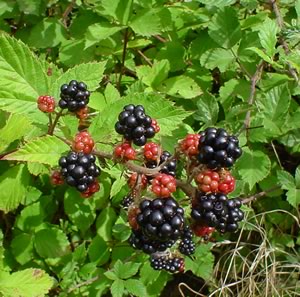amora
Jump to navigation
Jump to search
See also: Amora
Esperanto
[edit]Etymology
[edit]Pronunciation
[edit]Adjective
[edit]amora (accusative singular amoran, plural amoraj, accusative plural amorajn)
- sexual
- amora kontakto / sperto ― sexual contact / experience
- amora sceno ― sex scene
Galician
[edit]Alternative forms
[edit]Etymology
[edit]From Old Galician-Portuguese mora (13th century, Cantigas de Santa Maria), from Vulgar Latin *mora, from Latin mōrum, from Ancient Greek μόρον (móron).
Pronunciation
[edit]Noun
[edit]amora f (plural amoras)
- blackberry
- 1845, Alberto Camino, O desconsolo:
- Xa non iremos mais po-los roleiros
en compaña amorosa áas moras, non.
Nin baixo dos follosos ameneiros
as coitas che direi do corazon.- We'll no longer go by the hedges
in loving company for blackberries, no.
Nor under the leafy alders
the afflictions of the heart I'll tell you.
- We'll no longer go by the hedges
- mulberry (fruit)
Derived terms
[edit]References
[edit]- Ernesto Xosé González Seoane, María Álvarez de la Granja, Ana Isabel Boullón Agrelo (2006–2022) “mora”, in Dicionario de Dicionarios do galego medieval (in Galician), Santiago de Compostela: Instituto da Lingua Galega
- Xavier Varela Barreiro, Xavier Gómez Guinovart (2006–2018) “amora”, in Corpus Xelmírez - Corpus lingüístico da Galicia medieval (in Galician), Santiago de Compostela: ILG
- Antón Luís Santamarina Fernández, editor (2006–2013), “amora”, in Dicionario de Dicionarios da lingua galega [Dictionary of Dictionaries of the Galician language] (in Galician), Santiago de Compostela: Instituto da Lingua Galega
- Antón Luís Santamarina Fernández, Ernesto Xosé González Seoane, María Álvarez de la Granja, editors (2003–2018), “amora”, in Tesouro informatizado da lingua galega (in Galician), Santiago de Compostela: Instituto da Lingua Galega
- Rosario Álvarez Blanco, editor (2014–2024), “amora”, in Tesouro do léxico patrimonial galego e portugués (in Galician), Santiago de Compostela: Instituto da Lingua Galega, →ISSN
Occitan
[edit]Etymology
[edit]From Old Occitan [Term?], from Vulgar Latin *mōra, from Latin mōrum, from Ancient Greek μόρον (móron).
Pronunciation
[edit]Noun
[edit]amora f (plural amoras)
Derived terms
[edit]Portuguese
[edit]

Etymology
[edit]From Vulgar Latin *mōra, from Latin mōrum, from Ancient Greek μόρον (móron), from Proto-Indo-European *moro. Compare Galician amora, Italian and Spanish mora and French mûre.
Pronunciation
[edit]
Noun
[edit]amora f (plural amoras)
- mulberry (fruit)
- (by analogy) blackberry
- Synonyms: amora-silvestre, silva
Derived terms
[edit]- amoreira (“mulberry tree”)
Related terms
[edit]Categories:
- Esperanto terms suffixed with -a
- Esperanto terms with IPA pronunciation
- Rhymes:Esperanto/ora
- Esperanto lemmas
- Esperanto adjectives
- Esperanto terms with usage examples
- Galician terms inherited from Old Galician-Portuguese
- Galician terms derived from Old Galician-Portuguese
- Galician terms inherited from Vulgar Latin
- Galician terms derived from Vulgar Latin
- Galician terms inherited from Latin
- Galician terms derived from Latin
- Galician terms derived from Ancient Greek
- Galician terms with IPA pronunciation
- Galician lemmas
- Galician nouns
- Galician countable nouns
- Galician feminine nouns
- Galician terms with quotations
- gl:Fruits
- Occitan terms inherited from Old Occitan
- Occitan terms derived from Old Occitan
- Occitan terms inherited from Vulgar Latin
- Occitan terms derived from Vulgar Latin
- Occitan terms inherited from Latin
- Occitan terms derived from Latin
- Occitan terms derived from Ancient Greek
- Occitan terms with IPA pronunciation
- Occitan terms with audio pronunciation
- Occitan lemmas
- Occitan nouns
- Occitan feminine nouns
- Occitan countable nouns
- Portuguese terms inherited from Vulgar Latin
- Portuguese terms derived from Vulgar Latin
- Portuguese terms inherited from Latin
- Portuguese terms derived from Latin
- Portuguese terms derived from Ancient Greek
- Portuguese terms derived from Proto-Indo-European
- Portuguese 3-syllable words
- Portuguese terms with IPA pronunciation
- Portuguese lemmas
- Portuguese nouns
- Portuguese countable nouns
- Portuguese feminine nouns
- pt:Fruits